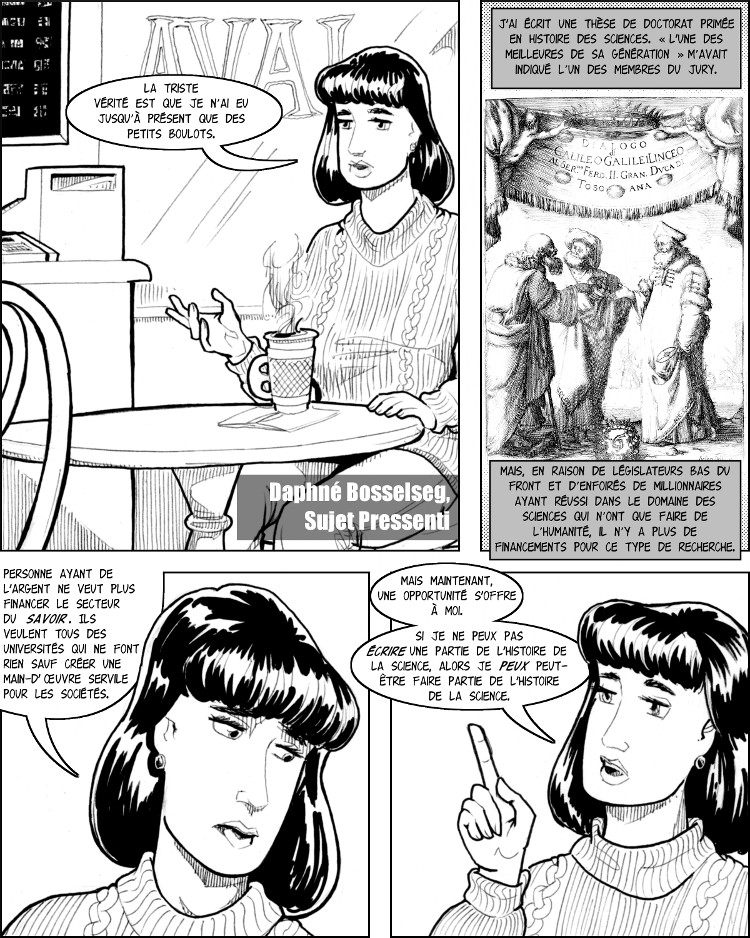

This work is licensed under a Creative Commons Attribution-NonCommercial-ShareAlike 4.0 International License.
PAGE 28 (Four panels)
Panel 1: DAPHNE BOSSELSEG (“Daphne”) sits in a coffeehouse, being interviewed. There is coffee on the table in front of her. Daphne is a dark-haired, dark-eyed, intense-looking youngish woman who wears a dark cable sweater and blue jeans.
Daphne (1): The bitter truth is, I’m facing a lifetime of asking “Do you want fries with that?”
Comment (1): “Do you want fries with that? Is a stock phrase in American English, the question asked by a fast-food counter worker. By extension, to have to ask the question means having a poorly-paid, unenjoyable, and low-status job. It can be translated either literally or with an equivalent phrase in the target language.
Translation (1): La triste vérité est que je n’ai eu jusqu’à présent que des petits boulots.
SUBTITLE (2): Daphne Bosselseg, prospective subject.
Translation (2): Daphné Bosselseg, sujet pressenti.
Panel 2: Front panel of the first edition of Galileo’s Dialogue Concerning the Two World Systems, over which are layered the captions of Daphne speaking.
CAPTION – DAPHNE NARRATING (3): I wrote an award-winning Ph.D. dissertation in the history of science. “One of the best of your generation,” my advisors told me.
Translation (2): J’ai écrit une thèse de doctorat primée en histoire des sciences. « L’une des meilleures de sa génération » m’avait indiqué l’un des membres du jury.
CAPTION – DAPHNE NARRATING (4): But thanks to yahoo state legislators and asshole STEM billionaires, there’s no funding for humanistic research like that anymore.
Comment (3): “Yahoo” is an American colloquial expression for a crude, ill-educated, and unsophisticated person, usually one of rural or small-town origins. “STEM” is an acronym for “science, technology, engineering, and mathematics,” and in this context might refer to someone who got rich making technology, but who is ignorant and also likely contemptuous of humanistic learning.
Translation (3): Mais, en raison de législateurs bas du front et d’enfoirés de millionnaires ayant réussi dans le domaine des sciences qui n’ont que faire de l’humanité, il n’y a plus de financements pour ce type de recherche.
Panel 3: Daphne back in interview position. She looks glum and pensive.
Daphne (5): No one with money wants to fund knowledge anymore. They all want universities that do nothing but make a compliant corporate workforce.
Translation (5): Personne ayant de l’argent ne veut plus financer le secteur du savoir. Ils veulent tous des universités qui ne font rien sauf créer une main-d’œuvre servile pour les sociétés.
Panel 4: Daphne being interviewed. She has brightened up, just a little.
Daphne (6): But now I have a chance at something.
Translation (6): Mais maintenant, une opportunité s’offre à moi.
Daphne (7): If I can’t write part of the history of science, then perhaps I can be part of the history of science.
Translation (7): Si je ne peux pas écrire une partie de l’histoire de la science, alors je peux peut-être faire partie de l’histoire de la science.
![]() Appât (Français/Version longue page)
Appât (Français/Version longue page)
Appât (Français/Version slider)

Yahoo is a brutish creature in the book Gulliver’s travels by Swift
The OED agrees with you (and who am I to disagree with it?) and gives Swift as the origin of the word, although I doubt that Swift is who most American speakers have in mind directly when they use it, even relatively erudite ones like Daphne.